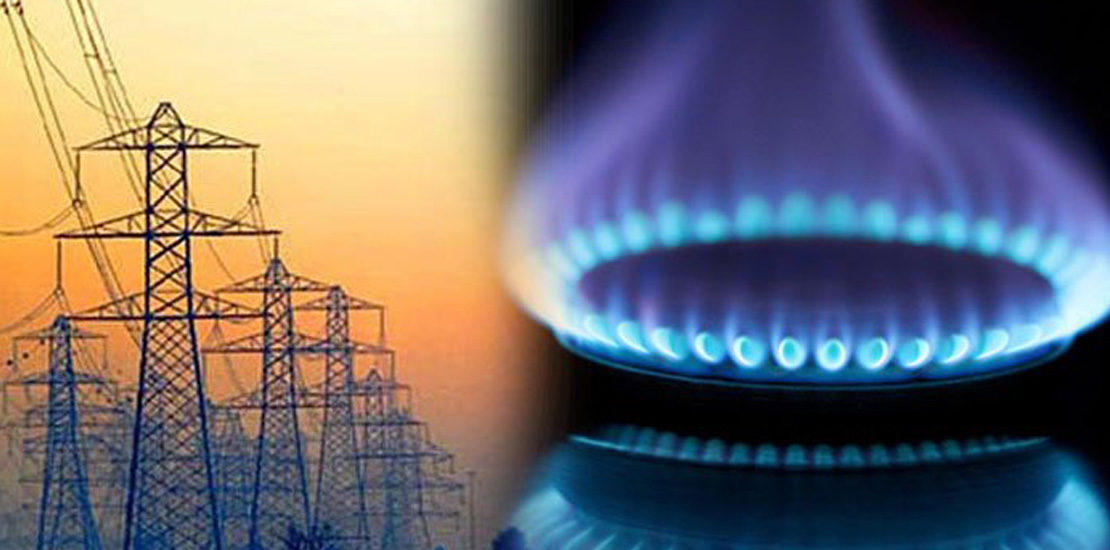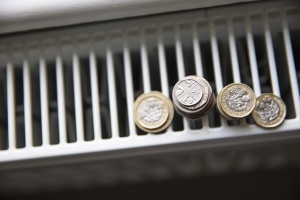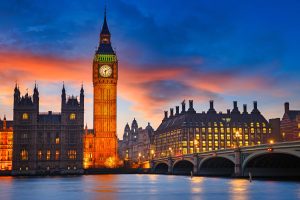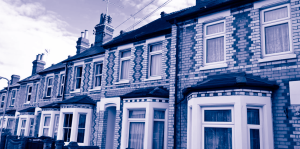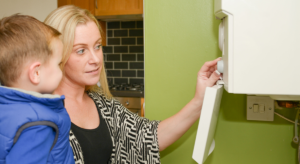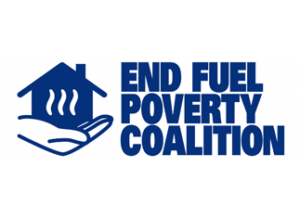Contact Anna Cook, Head of Communications and Campaigns on anna.cook@nea.org.uk and 07786 912173
Warning comes on Fuel Poverty Awareness Day which highlights the ‘cold reality’ of millions struggling to pay energy bills
- Fuel poverty charity National Energy Action has today warned average domestic energy bills have already soared by over £230 per customer compared to last winter
- NEA warns further increases to the GB price cap in April could see the average combined domestic dual fuel bill increase by a further £550 per year
- Most UK residential buildings (85% or 23 million homes) are still currently connected to the gas grid, using a boiler and central heating system to heat homes
- NEA also warns the average household gas bill could increase by £467 compared to October 2020. This means that the cost of heating the average home will have doubled since last winter.
- Six out of 10 British adults say they would reduce their heating use by a fair amount/great deal if the cost of heating doubles
Adam Scorer, Chief Executive of National Energy Action (NEA) comments:
“Every home should be a warm and safe place, but for over 4.5 million UK households the cold reality is very different and getting much worse.
“The cost of living in the UK is at its highest level in a decade with household energy bills the biggest driver. When the costs of essential services go up, those on lowest incomes get hit hardest.
“Bills have increased by well over £230 since last winter and millions now face a daily heat or eat dilemma. We estimate energy bills will rocket again in April, doubling the average householders’ heating bills since last year.
“Over the same period, those on the lowest incomes have seen their income plummet by over £1,000 per year. Just think about that. For people already on a budgetary knife-edge, the cost of keeping a family warm has exploded while budgets have collapsed. No amount of useful tips or savvy shopping can cope with that.”
Table highlighting NEA analysis of current and future GB gas heating bills:
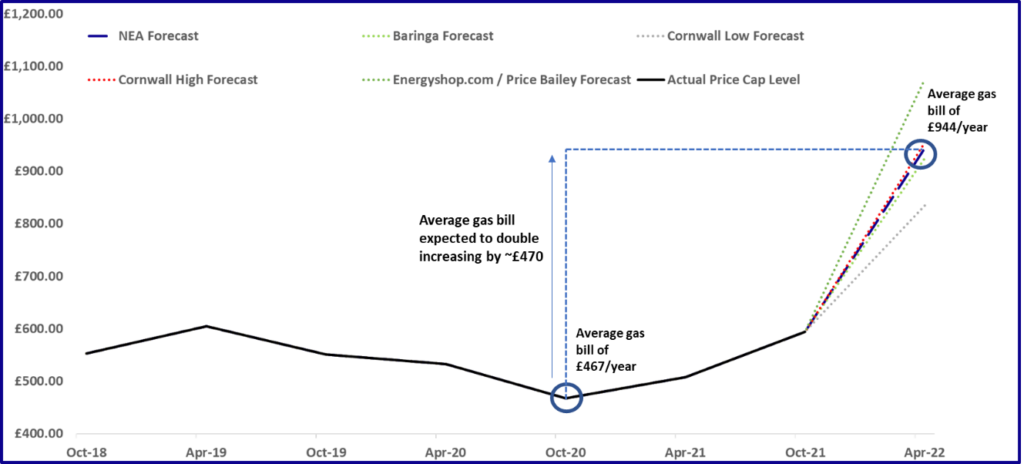
Scorer continues:
“Cold homes cause needless deaths and unnecessary physical and mental harm, impacting precious health services over the busiest winter months. Growing up cold can also permanently damage childhood development and future life chances
“The Chancellor missed a great opportunity to limit the damage in the November Budget. If the UK Government does not act decisively to help people on the lowest incomes keep their homes warm and safe, we will walk, with our eyes wide open, into a disastrous combination of problem debt, physical and mental harm and increasing numbers of avoidable winter deaths”.
The warning comes on Fuel Poverty Awareness Day [3rd December 2021] which highlights the ‘cold reality’ of millions struggling to pay energy bills. National Energy Action’s CEO, Adam Scorer, concludes:
“Friday 3 December is Fuel Poverty Awareness Day and we hope we see more support than ever. Like many organisations, National Energy Action offers direct support for those living in fuel poverty. We will be sharing a range of resources which we hope can get people through this winter and working with other organisations to highlight the huge amount of positive work they are doing to help people heat their homes. The good news is we, and increasing number of other organisations, know positive outcomes can be achieved if we can help keep more people warm and well in their own homes.”
ENDS
Notes to editors
- National Energy Action works across England, Wales and Northern Ireland to ensure that everyone in the UK can afford to live in a warm, safe home. For more information visit https://www.nea.org.uk/.
- To find out more about Fuel Poverty Awareness Day, to download our video and to find resources please go to https://www.nea.org.uk/nea-campaigns/fpad/.This also includes a short policy briefing which highlights the steps NEA believes are necessary to support customer through this winter and beyond.
- NEA has estimated that the average price of the average annual gas bill could increase by as much as £350 in April, with the electricity bill increasing by £200 (an overall increase of £550), when compared to the current level of the cap.
- This estimate is based on the median of previous estimates from Cornwall Insight, Baringa and EnergyShop.com, and taking into account the additional costs that will be added through the Supplier of Last Resort levy (£20 per meter), as well as increased social obligation costs (£7 per meter) and the potential for further increases from changes to the way that Ofgem calculates the price cap (up to £15/meter). This will lead to the average gas bill (as per the default tariff price cap) having increased from £466 in October 2020, to £944 in April 2022, doubling in 18 months.
- Last winter Public Health England (PHE) warned there is a damaging overlap between the health impacts of living in a cold home and Covid-19. Pre-existing chronic medical conditions such as cardiovascular and respiratory conditions, such as chronic obstructive pulmonary disease (COPD), asthma and heart disease are particularly badly affected by a cold home.
- Fuel poverty is often described as a devolved issue and each UK nation measures it in varying ways (see tables below). Fuel poverty is however affected by three common key factors: a household’s income, their fuel costs, and their energy consumption. In practice, energy consumption is primarily affected by the energy-efficiency of the household’s dwelling. UK wide policies effect household incomes, policies to improve energy efficiency standards across GB are affected via the Energy Company Obligation (ECO) and prices via the regulation and policies which effect GB wide energy prices.
- The polling in this release was carried out by YouGov from 26th to 28thNovember 2021 to gather a nationally and politically representative view of the impact of a doubling of the cost of heating a home and investigate what impact, if any, this would have on home heating habits. 59% say they would reduce their heating use by a fair amount/great deal if the cost of heating doubles.
- All figures, unless otherwise stated, are from YouGov Plc. Total sample size was 1,684 adults. Fieldwork was undertaken between 26th – 28th November 2021. The survey was carried out online. The figures have been weighted and are representative of all GB adults (aged 18+).
- For further details of the results please contact anna.cook@nea.org.uk.
- Further information on fuel poverty across the different UK nations, their respective definitions and targets is contained below (infographics with this information is also available).
ENGLAND
Definition: Low-income, Low Energy Efficiency (Household income lower than 60% of median income; EPC rating of worse than C).
Statutory target: For all fuel-poor households to reach EPC C by 2030. Corresponding milestones to reach EPC D by 2025 and EPC E by 2020.
| Progress towards the fuel poverty targets and milestones | |||
| Target/Milestone | 2010 progress | 2018 progress | 2019 progress |
| 2020 milestone (EPC E or above) | 91.5% | 97% | 97.4% |
| 2025 milestone (EPC D or above) | 64.5% | 86.8% | 88.8% |
| 2030 target (EPC C or above) | 14.6% | 44.4% | 47.8% |
SCOTLAND
Definition: a household is defined as being in fuel poverty if more than 10% of its net income (after housing costs) is required to heat the home and pay for other fuel costs, with not enough money left for a decent standard of living. If more than 20% of net income is needed, the household is defined as being in extreme fuel poverty.
Statutory target: no more than 5% of Scottish households in fuel poverty by 2040, and no more than 1% of households being in extreme fuel poverty. There are also targets to reduce household fuel poverty levels as progress is made towards meeting the 2040 targets.
| Target | Current (2019) | |
| In fuel poverty | <15% by 2030 / 10% by 2035 / 5% by 2040 | 24.6% |
| In extreme fuel poverty | <5% by 2030 / 3% by 2035 / 1% by 2040 | 12.4% |
| The media fuel poverty gap | £350 by 2030 / £300 by 2035 / £250 by 2040 | £750 |
WALES
Definitions:
- Fuel poverty: Households needing to pay more than 10% of their full household income to maintain a satisfactory heating regime.
- Severe fuel poverty: Households needing to pay more than 20% of their full household income to maintain a satisfactory heating regime.
- Persistent fuel poverty: Households needing to pay more than 10% of their full household income to maintain a satisfactory heating regime in two out of the three preceding years.
- At risk of fuel poverty: Households needing to pay more than 8%, but less than 10% of their full household income to maintain a satisfactory heating regime.
| Target | Current (2018) | |
| Fuel poverty in all households | 0% by 2018 | 12% |
| Fuel poverty in vulnerable households | 0% by 2010 | 11% |
| Fuel poverty in social housing | 0% by 2012 | 9% |
NORTHERN IRELAND
Definition: A household is said to be in fuel poverty if it needs to spend more than 10% of its income on energy costs.
Statutory target: 2014 target to alleviate fuel poverty by targeting 33,000 in extreme fuel poverty (25% of income).
| Target | Current (2018) | |
| Fuel poverty in all households | None at present | 22% / 160,000 |
| In severe fuel poverty (15%+) | 33,000 spending 25% of income | 6% / 43,800 |
Subscribe to receive news releases to email


